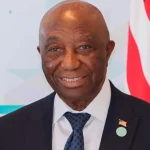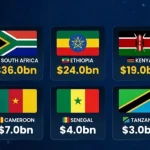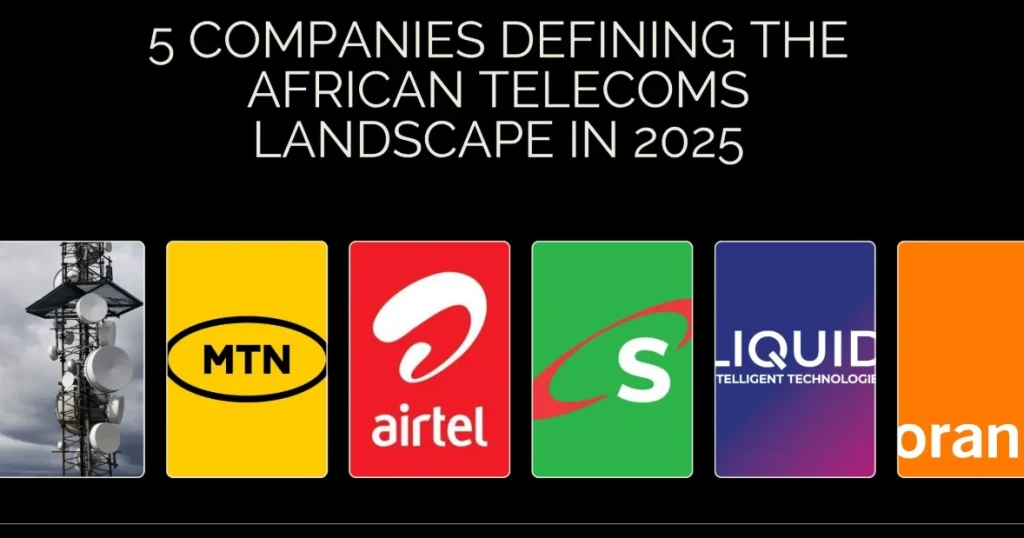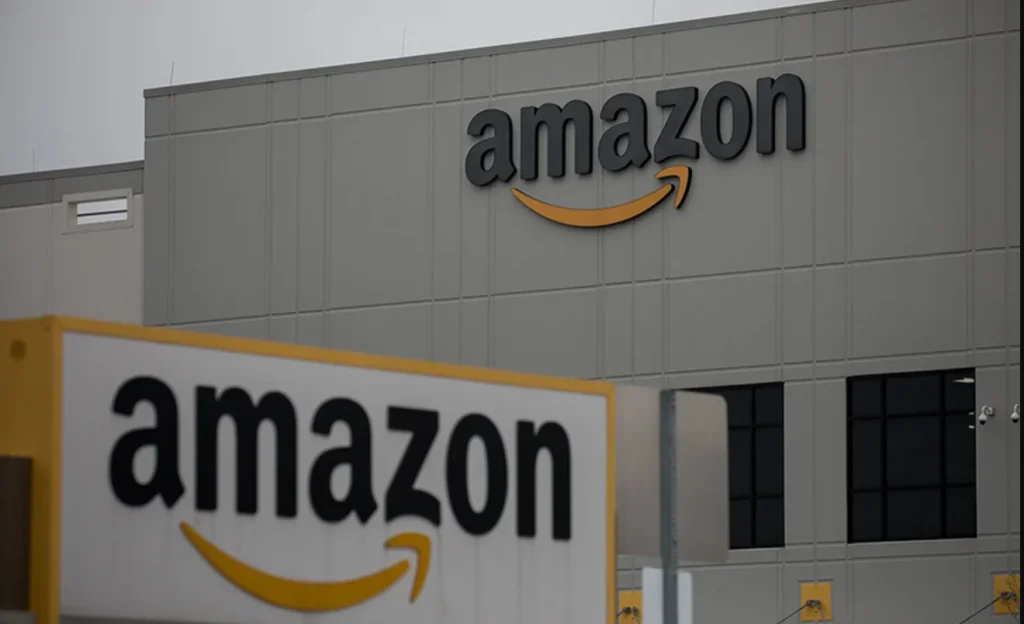The African telecommunications sector has undergone a profound transformation, not just in terms of scale but in how it has defined the concepts of connectivity, digital inclusion, and technological innovation.
While legacy metrics like subscriber count and revenue still matter, the continent’s most impactful telecom companies today are those investing in long-term infrastructure, digital equity, and frontier technologies like 5G, AI, and IoT.
Here’s a deep dive into five telecom powerhouses that are not just competing for market share but actively disrupting and reshaping the African telecom narrative.
1. MTN Group: Building the continent’s 5G superhighway
MTN Group, headquartered in South Africa, stands at the forefront of Africa’s telecom revolution, not just as its largest operator but arguably its most visionary.
With active 5G deployments in South Africa, Nigeria, and Zambia, MTN has set the pace for next-gen network capabilities. The company is also piloting 5G technology in other key markets such as Uganda and Côte d’Ivoire.
These efforts are part of its “Ambition 2025” strategy, which positions MTN as a “platform player” in Africa’s evolving digital economy.
But the disruption does not stop at faster internet. MTN is building digital ecosystems around mobile finance (MoMo), health tech, and e-learning, bringing essential services to millions. It’s also pushing for rural network expansion, aiming to bring affordable broadband to remote regions where connectivity has long been a luxury.
“Connectivity is a human right. Our goal is to connect the unconnected and drive socio-economic transformation through digital inclusion,” said Ralph Mupita, MTN Group CEO.
Disruption Metric:
- The most widespread 5G rollout in Africa.
- Active rural broadband programmes in over 10 markets.
- Mobile money platform serving 60+ million active users.
2. Airtel Africa: Democratising the internet through affordability
Airtel Africa has made massive strides in bridging the affordability gap, a key barrier to internet adoption across much of Sub-Saharan Africa. By targeting low-income demographics with competitively priced data and entry-level smartphones, Airtel is challenging the traditional notion that connectivity is only for the urban elite.
One of its most notable projects is the “Smartphone for Everyone” initiative, done in partnership with Google and KaiOS. This programme delivers 3G/4G-enabled devices at extremely low costs, bundled with flexible data plans, particularly in countries like Kenya, Rwanda, and Nigeria.
Airtel’s infrastructure play has also intensified. The company recently partnered with Liquid Intelligent Technologies to enhance fibre capacity and has benefited from Google’s Equiano undersea cable, boosting speed and lowering latency for West African markets.
“We are focused on providing meaningful access, not just coverage. Our goal is affordable, high-quality internet for all,” said Olusegun Ogunsanya, CEO of Airtel Africa.
Disruption Metric:
- 145 million mobile subscribers across 14 African countries.
- Low-cost smartphone penetration strategy targeting 20M users.
- Ongoing fibre expansion in collaboration with regional infrastructure providers.
3. Safaricom: Innovation beyond telecom
Safaricom’s reputation as a telecom disruptor is well earned. While the Kenyan-based company is best known for launching M-Pesa, the world’s most successful mobile money platform, it has continuously evolved to become a technology-first telecom operator.
In 2022, Safaricom launched Kenya’s first commercial 5G network, with speeds reaching up to 700 Mbps. The company has since integrated IoT services for agriculture and logistics, launched a telehealth platform (M-Tiba), and begun AI-based fraud detection in financial transactions.
Safaricom is also making bold moves regionally. Its entry into Ethiopia, Africa’s second-largest population, is seen as one of the most ambitious expansions in recent telecom history.
The move includes over $1 billion in network investment and digital services rollouts over the next five years, as well as its commitment to invest %500 million in AI infrastructure across the East African region within the next three years.
“We are redefining what it means to be a telco. Our focus is on transforming lives through tech-enabled solutions,” said Peter Ndegwa, Safaricom CEO.
Disruption Metric:
- First operator to launch 5G in East Africa.
- Over 51 million M-Pesa users.
- Entry into Ethiopia with large-scale investment in infrastructure and jobs.
4. Liquid Technologies: Africa’s digital infrastructure powerhouse
Formerly Liquid Telecom, this Pan-African infrastructure provider has quietly become the digital spine of Africa’s internet economy. With over 100,000 kilometres of fibre optic network, Liquid is connecting cities, countries, and underserved regions alike.
Liquid’s mission goes beyond telecom. Its growing network of data centres, cloud partnerships (notably with Microsoft Azure), and enterprise solutions make it a critical enabler of everything from e-commerce to e-governance.
Its latest East-West fibre corridor, stretching from Mombasa to Dakar, offers faster and more reliable internet across the continent, at a time when latency and bandwidth remain major challenges.
“We see ourselves as Africa’s digital architects. Without infrastructure, there is no digital future,” said Nic Rudnick, Chairman of Liquid Intelligent Technologies.
Disruption Metric:
- Africa’s largest independent fibre network.
- Strategic cloud/data partnerships with global tech firms.
- Cross-border digital corridor projects in East and West Africa.
5. Orange: Empowering Francophone Africa
Orange’s African strategy, particularly in Francophone West and Central Africa, focuses on inclusion and infrastructure. Operating in 18 African countries, Orange is investing heavily in rural connectivity, energy-efficient towers, and digital literacy.
One of its standout initiatives is the launch of Orange Digital Centres in countries like Senegal, Tunisia, and Côte d’Ivoire. These centres offer training in coding, cybersecurity, and entrepreneurship, helping to nurture Africa’s digital workforce.
Orange is also testing 5G networks in multiple countries and recently inaugurated a Tier III data centre in Abidjan, enhancing local data sovereignty and enterprise capacity.
“Africa is central to our growth strategy, and we believe in long-term investments that empower local communities,” said Alioune Ndiaye, Chairman of Orange Middle East and Africa.
Disruption Metric:
- Digital skill-building programmes across 10+ countries.
- Active 5G trials and Tier III data centres in key markets.
- Over 70 million Orange Money users on the continent.
In sum
These five telecom companies are not just expanding networks; they are building digital lifelines for millions.
From AI-driven services to grassroots connectivity programmes, the disruption is not about who’s biggest; it is about who is bold enough to rethink telecom in a uniquely African context.
As digital adoption accelerates and demand for smart, scalable infrastructure grows, these companies are laying the groundwork for what could be Africa’s most transformative decade yet.
















